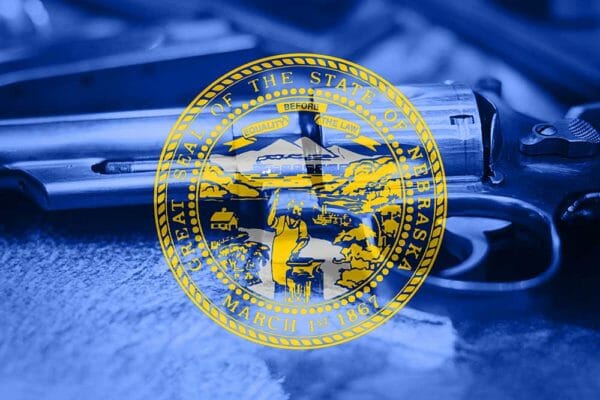
U.S.A. –-(AmmoLand.com)-– Nebraska Constitutional Carry (permitless carry) is advancing in the Nebraska Senate. On March 11, 2022, the Senate (Nebraska is the only state with a unicameral legislature) voted for Cloture on LB 773. Cloture votes in Nebraska are required after 8 hours of debate in this stage of the legislative process, which is designated a General File.
The General File vote is considered the most difficult hurdle for a bill to overcome on the way to becoming law in Nebraska. The cloture vote needed 33 votes, or two-thirds of the senate, to proceed. There are 49 senators in the Nebraska Senate. From Omaha.com:
Nebraska law allows people to carry visible weapons in the Capitol, as Schroder did, although they cannot be taken into the legislative chamber. Concealed weapons are barred from the building.
Lawmakers adjourned without reaching a vote on LB 773, as opponents mounted a filibuster. A motion to cut off the filibuster is expected Friday morning, after about two more hours of debate. The motion needs 33 votes to succeed.
Senator Tom Brewer has been the moving force behind Constitutional Carry in the Nebraska legislature. It has been a top priority for him for the last six years.
LB 773 received 33 yes votes, then three votes were changed from no to yes, to make it 36 total yes votes.
I spoke to Senator Brewer a couple of years ago. Senator Brewer opined he had the votes to pass Constitutional Carry if he could get the bill to a floor vote. The vote on March 11 showed that Senator Brewer (R – 43) is able to count votes. It is an important skill for a legislator.
Tony Baker, of Senator Tom Brewer’s office, was willing to spend some time on the telephone and answer questions.
The three senators who changed votes after it was clear LB 733 had passed the General File vote were:
- Senator Carol Blood of District 3
- Senator Jen Day of District 49.
- Senator John McCollister of District 20
All three senators are reputed to be left of center. Senators in Nebraska do not have an official party designation. Senators Blood and Day are said to be flavored Democrat, while Senator McCollister is said to be flavored Republican. 32 of the Nebraska senators are said to be flavored Republican.
The Nebraska legislature has a unique filibuster system, which makes it as difficult to enact a bill as in a two-chamber legislature.
First, a bill has to get through the General File, with a limit of 8 hours of debate before a cloture vote. A two-thirds super-majority is required, giving a determined minority of one-third a veto on any legislation.
After the General File vote, a Select File vote is scheduled, with a limit of 4 hours of debate before the cloture vote, which also requires a two-thirds super-majority vote.
Then a Final Reading is scheduled, with a limit of 2 hours of debate before the cloture vote, which also requires a two-thirds super-majority vote to pass.
Effectively, determined opponents of a bill have three different opportunities to find more than one-third of senators, to kill a bill. In Nebraska, this is 17 Senators.
Tony Baker said three groups are necessary to move a bill such as Constitutional Carry through the Nebraska legislature. The three groups are: Senators, the people (thousands called in, emailed, wrote cards), and the legal council. Baker said Dick Clark, legal counsel to Senator Brewer, is the best Constitutional lawyer in the central USA.
Baker said the thousands of Nebraska citizens who supported the bill were absolutely essential to move the bill this far.
He singled out the Nebraska Firearms Association as being particularly helpful.
The passage of Constitutional Carry bill LB 773 through the General File means final passage is likely, legislative approval will not be complete until the Final Reading vote is taken.
If the bill passes the Senate, it will be sent to the governor for approval. The Governor has five days (not counting Sundays) to sign or veto a bill. If he does nothing, the bill becomes law.
The Senate can override a veto with a three-fifths vote, which in Nebraska, is 30 senators.
About Dean Weingarten:
Dean Weingarten has been a peace officer, a military officer, was on the University of Wisconsin Pistol Team for four years, and was first certified to teach firearms safety in 1973. He taught the Arizona concealed carry course for fifteen years until the goal of Constitutional Carry was attained. He has degrees in meteorology and mining engineering, and retired from the Department of Defense after a 30 year career in Army Research, Development, Testing, and Evaluation.

